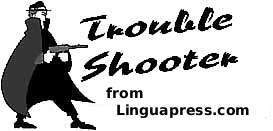
Explaining some of the everyday words in English, that are easy to confuse
Expressing past action with used to
How and when to use used to when referring to actions in past time
| Index : | Affirmative uses | Negative and interrogative | used to / be used to |
Meaning
As explained in the page on past tenses in English, the auxiliary used to is used to express a finished habit, or terminated action or situation. Students must remember that used to is always used in the preterite (past) form. There is no present form.Used to in affirmative statements
Use of this auxiliary in affirmative declarative statements is fairly easy to master, as the examples below show :Examples :
- When I lived in London, I used to cycle to work..
- They used to have fast trains on this line, but not any longer.
- It's amazing to think that over 20,000 people used to live here a century ago.
- The kids used to be driven to school, but now they take the bus.
- He always used to consult with experts, but now he makes his own decisions.
- His eyes are humbler than they used to be. (Shakespeare: Henry V).
Without using an adverb of time, used to (note the spelling) is the only way in English of specifying a finished habit or a terminated situation.
Although used to is found more commonly in spoken English, it is in no way true to say (as some grammar websites claim) that it is informal, and not used in formal writing. Here are some examples from formal documents.
Examples :
- As recently as the 1980s people used to work in the USA and live in Mexico, the crossing being a daily routine .... (Lifeforce Magazine 2014)...
- Why are Americans less charitable than they used to be ? (TheAtlantic.com - buisness archive 2016)
- Holiday shoppers are not spending like they used to .... (The Economist- 2016)
- The United Kingdom used to be extremely good at taking the opportunity to innovate. (Hansard - UK parliament- 2016).
While used to is easily and commonly used in affirmative declarative statements, using it in interrogative and/or negative contexts is sometimes problematical, even for native English speakers..
Used to in negative statements
There are two possible forms - did not use to / didn't use to and used not to . A third form, usedn't to, is not normally considered to be standard English..The difference in usage is generally stylistic and contextual . Didn't use to is more common in spoken English ; used not to is considered more formal and more appropriate in written English. Usedn't to is not commonly used except in Ireland Scotland and New Zealand.
Important: Do not make this common mistake. Do not write did not used to. This is generally considered to be bad grammar.
Examples :
- I didn't use to believe in love at first sight
- The shop didn't use to sell fresh fish, but now it does.
- The river didn't use to flood every year, as it does nowadays..
- I can speak Greek now, though I didn't use to be able to.
- They want to work with people they care about. It used not to be that way. (The Guardian- 2014)
- Other policy reforms, that we used not to think of as macroeconomic, are critical... (IMF - 2014)
- This used not to be a problem but it's now rather worrying.
Used
to in questions
Used
to is not
commonly used in questions in standard English. However it
will be used in spoken English if the speaker wishes to stress
the circumstances of finished habit, or terminated situation.There are two possible structures:
- Did you use to ? or Didn't you use to...? and
- Used there to be? or Used there not to be
Curiously, perhaps the most commonly found interrogative use of used to is in negative questions, as in Didn't you use to be friendly with my sister?
Examples (for information only...
use these forms with great care ) :
- Didn't you use to be friendly with my sister?
- Didn't there use to be a cinema here in the olden days?
- How often used he to play a round of golf ?
Avoid confusion : used to or be used to
Students learning English frequently confuse the two similar but entirely different expressions used to and be used to.
If the words used to are followed by a noun or a pronoun object, they must be being used in the expression be used to or one of its forms.
To be used to is a verbal expression meaning "to be accustomed to do" or "to be in the habit of doing" something. When followed by a verb, the verb will always be in the form of a gerund (-ing form)
Examples :
I'm quite
used to it.
Canadians are used to long cold winters.
The President is used to consulting with his team of advisors.
Compare with: The President used to consult with his team of advisors
Are you used to running marathons ?
Compare with: Did you use to run marathons ?
Canadians are used to long cold winters.
The President is used to consulting with his team of advisors.
Compare with: The President used to consult with his team of advisors
Are you used to running marathons ?
Compare with: Did you use to run marathons ?
Copyright : Website and texts © Linguapress.com except where otherwise indicated
Return to Linguapress home page



 Copyright
information.
Copyright
information.